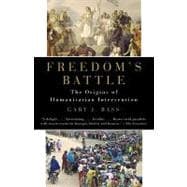
Note: Supplemental materials are not guaranteed with Rental or Used book purchases.
Purchase Benefits
What is included with this book?
| Introduction | p. 1 |
| Humanitarinism or Imperialism? | p. 2 |
| Media and Solidarity | p. 25 |
| The Diplomacy of Humanitarian Intervention | p. 39 |
| Greeks | p. 45 |
| The Greek Revolution | p. 51 |
| The Scio Massacre | p. 67 |
| The London Greek Committee | p. 76 |
| Americans and Greeks | p. 88 |
| Lord Byron's War | p. 100 |
| Canning | p. 111 |
| The Holly Alliance | p. 117 |
| A Rumor of Slaughter | p. 123 |
| Navarino | p. 137 |
| Syrians | p. 153 |
| Napoléon the Little | p. 159 |
| The Massacres | p. 163 |
| Public Opinion | p. 182 |
| Occupying Syria | p. 190 |
| Mission Creep | p. 213 |
| Bulgarians | p. 233 |
| The Eastern Question | p. 239 |
| Pan-Slavism | p. 242 |
| Bosnia and Serbia | p. 248 |
| Bulgarian Horrors | p. 256 |
| Gladstone vs. Disraeli | p. 266 |
| The Russo-Turkish War | p. 297 |
| The Midlothian Campaign | p. 305 |
| Conclusion | p. 313 |
| Armenians | p. 315 |
| The Uses of History | p. 341 |
| The International Politics of Humanitarian Intervention | p. 352 |
| The Domestic Politics of Humanitarian Intervention | p. 367 |
| A New Imperialism? | p. 376 |
| Notes | p. 383 |
| Acknowlegments | p. 483 |
| Index | p. 487 |
| Table of Contents provided by Ingram. All Rights Reserved. |
The New copy of this book will include any supplemental materials advertised. Please check the title of the book to determine if it should include any access cards, study guides, lab manuals, CDs, etc.
The Used, Rental and eBook copies of this book are not guaranteed to include any supplemental materials. Typically, only the book itself is included. This is true even if the title states it includes any access cards, study guides, lab manuals, CDs, etc.
Excerpted from Freedom's Battle: The Origins of Humanitarian Intervention by Gary J. Bass
All rights reserved by the original copyright owners. Excerpts are provided for display purposes only and may not be reproduced, reprinted or distributed without the written permission of the publisher.